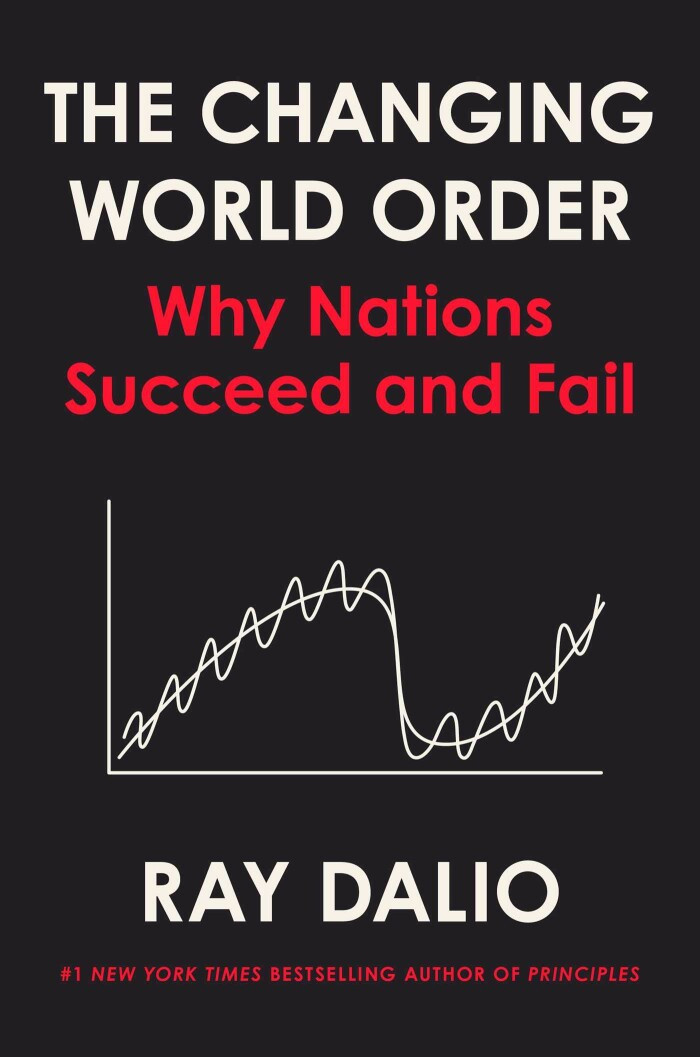
Support the author by purchasing this book with the link below!
PurchaseThe Changing World Order
Ray Dalio
Published: 2021
In "The Changing World Order," Ray Dalio explores the major shifts currently taking place in the global economy and politics. Drawing on his extensive experience as an investor and philanthropist, Dalio examines the key factors driving these changes, including technological advancement, the rise of emerging markets, and the changing balance of power between different nations.
One central theme of the book is the increasing influence of China, which Dalio sees as a major force shaping the new world order. He discusses the rise of China as a global player and the potential implications of this shift for the United States and other nations. Dalio also delves into the ongoing impacts of globalization, highlighting the ways in which it has brought people and economies closer together, as well as the challenges it has created.
In addition to these macroeconomic trends, Dalio also discusses the growing importance of artificial intelligence and other new technologies, and the potential impacts they may have on businesses and individuals in the coming years. He also addresses the ongoing challenges posed by issues like climate change and global inequality, and offers suggestions for how to address these pressing problems.
Throughout the book, Dalio provides insights and analysis on the opportunities and challenges presented by the changing world order, and he offers practical guidance for individuals, businesses, and governments looking to navigate this rapidly evolving landscape. Whether you are a seasoned investor or simply interested in understanding the forces shaping our world today, "The Changing World Order" is a must-read for anyone looking to stay ahead of the curve in the 21st century.
One central theme of the book is the increasing influence of China, which Dalio sees as a major force shaping the new world order. He discusses the rise of China as a global player and the potential implications of this shift for the United States and other nations. Dalio also delves into the ongoing impacts of globalization, highlighting the ways in which it has brought people and economies closer together, as well as the challenges it has created.
In addition to these macroeconomic trends, Dalio also discusses the growing importance of artificial intelligence and other new technologies, and the potential impacts they may have on businesses and individuals in the coming years. He also addresses the ongoing challenges posed by issues like climate change and global inequality, and offers suggestions for how to address these pressing problems.
Throughout the book, Dalio provides insights and analysis on the opportunities and challenges presented by the changing world order, and he offers practical guidance for individuals, businesses, and governments looking to navigate this rapidly evolving landscape. Whether you are a seasoned investor or simply interested in understanding the forces shaping our world today, "The Changing World Order" is a must-read for anyone looking to stay ahead of the curve in the 21st century.
The world is undergoing significant shifts in its economic and political structure.
These changes are being driven by a range of factors, including technological change, the rise of emerging markets, and the shifting balance of power between different nations.
China is playing an increasingly influential role in the new world order.
Globalization, new technologies, and issues like climate change and global inequality will continue to shape the changing world order.
To succeed in this changing environment, individuals and businesses must be able to adapt and take advantage of new opportunities.
These changes are being driven by a range of factors, including technological change, the rise of emerging markets, and the shifting balance of power between different nations.
China is playing an increasingly influential role in the new world order.
Globalization, new technologies, and issues like climate change and global inequality will continue to shape the changing world order.
To succeed in this changing environment, individuals and businesses must be able to adapt and take advantage of new opportunities.
A few years ago, renowned investor Ray Dalio began noticing a confluence of political and economic conditions he hadn’t encountered before in his fifty-year career. They included large debts and zero or near-zero interest rates in the world’s three major reserve currencies; significant wealth, political, and values divisions within countries; and emerging conflict between a rising world power (China) and the existing one (US). Seeking to explain the cause-effect relationships behind these conditions, he began a study of analogous historical times and discovered that such combinations of conditions were characteristic of periods of transition, such as the years between 1930 and 1945, in which wealth and power shifted in ways that reshaped the world order. Looking back across five hundred years of history and nine major empires—including the Dutch, the British, and the American—The Changing World Order puts into perspective the cycles and forces that have driven the successes and failures of all the world’s major countries throughout history. Dalio reveals the timeless and universal dynamics that were behind these shifts, while also offering practical principles for policymakers, business leaders, investors, and others operating in this environment.
Reviews
-

A Must-Read for Anyone Seeking to Understand the Forces Shaping Our World Today
Published 3 years ago by fulcrum-security
I recently finished reading "The Changing World Order" by Ray Dalio and was thoroughly impressed by the depth and breadth of his analysis. Dalio does an excellent job of examining the major shifts currently taking place in the global economy and politics, and he offers valuable insights into the key drivers of these changes. One...
Read Review
